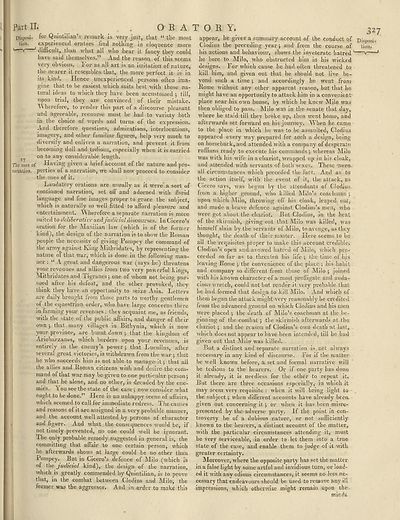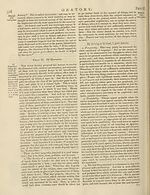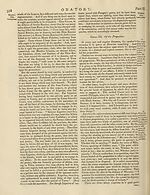Encyclopaedia Britannica > Volume 15, NIC-PAR
(377) Page 327
Download files
Complete book:
Individual page:
Thumbnail gallery: Grid view | List view

Part II. . ORA
Disposi- Quintilian s remark is very just, that “ the most
lion. experienced orators iind nothing in eloquence more
~rT~^ difficult, than what all who hear it fancy they could
have said themselves.” And the reason of this seems
very obvious, tor as all art is an imitation of nature,
the nearer it resembles that, the more perfect it is in
its kind. Hence unexperienced persons often ima¬
gine that to be easiest which suits best with those na¬
tural ideas to which they have been accustomed ; till,
upon trial, they are convinced of their mistake.
’Wherefore, to render this part of a discourse pleasant
and agreeable, recourse must be had to variety both
in the choice of words and turns of the expression.
And therefore questions, admiratisns, interlocutions,
imagery, and other familiar figures, help very much to
diversify and enliven a narration, and prevent it from
becoming dull and tedious^ especially when it is carried
^ on to any considerable length.
The uses of Having given a brief account of the nature and pro-
narration. perties ot a narration, we shall now proceed to consider
the uses of it.
Laudatory orations are usually as it were’ a sort of
continued narration, set off and adorned with florid
language and fine images proper to grace the subject,
which is naturally so well fitted to afford pleasure and
entertainment. Wherefore a separate narration is more
suited to deliberative judicial discourses. In Ci cero’s
oration for the Maniiian law (which is of the former
kind), the design of the narration is to show the Roman
people the necessity of giving Pompey the command of
the army against King Mithridates, by representing the
nature ot' that war, which is done in the following man¬
ner : “ A great and dangerous war (says he) threatens
your revenues and allies from two very powerful kings,
Mithridates and Tigranes; one of whom not being pur¬
sued after his defeat, and the other provoked, they
think they have an opportunity to seize Asia. Letters
are daily brought from those parts to worthy gentlemen
of the equestrian order, who have large concerns there
in farming your revenues : they acquaint me, as friends,
with the state of the public affairs, and danger of their
own ; that many villages in Bithynia, which is now
your province, are burnt down } that the kingdom of
Ariobarzanvs, which borders upon your revenues, is
entirely in the enemy’s power j that Lucullus, after
several great victories, is withdrawn from the war 5 that
he who succeeds him is not able to manage it; that all
the allies and Roman citizens wish and desire the com¬
mand of that war may be given to one particular person j
and that he alone, and no other, is dreaded by the ene¬
mies. You see the state of the case; now consider what
ought to be done.” Here is an unhappy scene of affairs,
which seemed to call for immediate redress. The causes
and reasons of it are assigned in a very probable manner,
and the account well attested by persons of character
and figure. And what the consequences would be, if
not timely prevented, no one could well be ignorant.
'Hie only probable remedy suggested in general is, the
committing that affair to one certain person, which
he afterwards shows at large could be no other than
Pompey. But in Cicero’s defence of Milo (which is
of the judicial kind), the design of the narration,
which is greatly commended by Quintilian, is to prove
that, in the combat between Clodius and Milo, the
former was the aggressor. And in order to make this
r o R y.
appear, he gives a summary account of the conduct of
Clodius the preceding year; and from the course of
his actions and behaviour, shows the inveterate hatred
he bore to Milo, who obstructed him in his wicked
designs. For which cause he had often threatened to
kill him, and given out that he should not live be¬
yond such a time ; and accordingly lie went from
Rome without any other apparent reason, but that lie
might have an opportunity to attack him in a convenient
place near his own house, by which he knew Milo was
then obliged to pass. Milo was in the senate that day,
where he staid till they broke up, then went home, and
afterwards set forward on his journey. When he came
to the place in which he was to be assaulted, Clodius
appeared every way prepared for such a design, being
on horseback, and attended with a company of desperate
ruffians ready to execute his commands; whereas Milo
was with his wife in a chariot, wrapped up in his cloak,
and attended with servants of both sexes. These were
all circumstances which preceded the fact. And as to
the action itself, with the event of it, the attack, as
Cicero says, was begun by the attendants of Clodius
from a higher ground, who killed Milo’s coachman ;
upon which Milo, throwing off his cloak, leaped out,
and made a brave defence against Clodius’s men, who
were got about the chariot. But Clodius, in the heat
of the skirmish, giving out that Milo was killed, was
himself slain by the servants of Milo, to avenge, as they
thought, the death of their master. Here seems to be
all the requisites proper to make this account credible.
Clodius’s open and avowed hatred of Milo, which pro¬
ceeded so far as to threaten his life ; the time of Id's
leaving Rome ; the convenience of the place ; his habit
and company so different from those of Milo ; joined
■with his known character of a most profligate and auda¬
cious wretch, could not but render it very probable that
he had formed that design to kill Milo. And which of
them began the attack might very reasonably he credited
from the advanced ground on which Clodius and his men
were placed ; the death of Milo’s coachman at the be¬
ginning of the combat ; the skirmish afterwards at the
chariot ; and the reason of Clodius’s own death at last,
which does not appear to have been intended, till he had
given out that Mi in was killed.
But a distinct and separate narration is . not always
necessary in any kind of discourse. For if the matter
he well known before, a set and formal narrative will
be tedious to the hearers. Or if one party has done
it already* it is needless for the other to repeat it.
But there are three occasions especially, in which it
may seem very requisite : when it will bring light to
the subject; when different accounts have already been,
given out concerning it ; or when it lias been misre¬
presented by the adverse party. If the point in con¬
troversy be of a dubious nature, or not sufficiently
known to the hearers, a distinct account of the matter,
with the particular circumstances attending it, must
be very serviceable, in order to let them into a true
state of the case, and enable them to judge of it with
greater certainty.
Moreover, where the opposite party has set the matter
in a false light by some artful and invidious turn, or load¬
ed it with any odious circumstances, it seems no less ne¬
cessary that endeavours should be used to remove any ill
impressions, which otherwise might remain upon the
minds
327
Disposi¬
tion*
Disposi- Quintilian s remark is very just, that “ the most
lion. experienced orators iind nothing in eloquence more
~rT~^ difficult, than what all who hear it fancy they could
have said themselves.” And the reason of this seems
very obvious, tor as all art is an imitation of nature,
the nearer it resembles that, the more perfect it is in
its kind. Hence unexperienced persons often ima¬
gine that to be easiest which suits best with those na¬
tural ideas to which they have been accustomed ; till,
upon trial, they are convinced of their mistake.
’Wherefore, to render this part of a discourse pleasant
and agreeable, recourse must be had to variety both
in the choice of words and turns of the expression.
And therefore questions, admiratisns, interlocutions,
imagery, and other familiar figures, help very much to
diversify and enliven a narration, and prevent it from
becoming dull and tedious^ especially when it is carried
^ on to any considerable length.
The uses of Having given a brief account of the nature and pro-
narration. perties ot a narration, we shall now proceed to consider
the uses of it.
Laudatory orations are usually as it were’ a sort of
continued narration, set off and adorned with florid
language and fine images proper to grace the subject,
which is naturally so well fitted to afford pleasure and
entertainment. Wherefore a separate narration is more
suited to deliberative judicial discourses. In Ci cero’s
oration for the Maniiian law (which is of the former
kind), the design of the narration is to show the Roman
people the necessity of giving Pompey the command of
the army against King Mithridates, by representing the
nature ot' that war, which is done in the following man¬
ner : “ A great and dangerous war (says he) threatens
your revenues and allies from two very powerful kings,
Mithridates and Tigranes; one of whom not being pur¬
sued after his defeat, and the other provoked, they
think they have an opportunity to seize Asia. Letters
are daily brought from those parts to worthy gentlemen
of the equestrian order, who have large concerns there
in farming your revenues : they acquaint me, as friends,
with the state of the public affairs, and danger of their
own ; that many villages in Bithynia, which is now
your province, are burnt down } that the kingdom of
Ariobarzanvs, which borders upon your revenues, is
entirely in the enemy’s power j that Lucullus, after
several great victories, is withdrawn from the war 5 that
he who succeeds him is not able to manage it; that all
the allies and Roman citizens wish and desire the com¬
mand of that war may be given to one particular person j
and that he alone, and no other, is dreaded by the ene¬
mies. You see the state of the case; now consider what
ought to be done.” Here is an unhappy scene of affairs,
which seemed to call for immediate redress. The causes
and reasons of it are assigned in a very probable manner,
and the account well attested by persons of character
and figure. And what the consequences would be, if
not timely prevented, no one could well be ignorant.
'Hie only probable remedy suggested in general is, the
committing that affair to one certain person, which
he afterwards shows at large could be no other than
Pompey. But in Cicero’s defence of Milo (which is
of the judicial kind), the design of the narration,
which is greatly commended by Quintilian, is to prove
that, in the combat between Clodius and Milo, the
former was the aggressor. And in order to make this
r o R y.
appear, he gives a summary account of the conduct of
Clodius the preceding year; and from the course of
his actions and behaviour, shows the inveterate hatred
he bore to Milo, who obstructed him in his wicked
designs. For which cause he had often threatened to
kill him, and given out that he should not live be¬
yond such a time ; and accordingly lie went from
Rome without any other apparent reason, but that lie
might have an opportunity to attack him in a convenient
place near his own house, by which he knew Milo was
then obliged to pass. Milo was in the senate that day,
where he staid till they broke up, then went home, and
afterwards set forward on his journey. When he came
to the place in which he was to be assaulted, Clodius
appeared every way prepared for such a design, being
on horseback, and attended with a company of desperate
ruffians ready to execute his commands; whereas Milo
was with his wife in a chariot, wrapped up in his cloak,
and attended with servants of both sexes. These were
all circumstances which preceded the fact. And as to
the action itself, with the event of it, the attack, as
Cicero says, was begun by the attendants of Clodius
from a higher ground, who killed Milo’s coachman ;
upon which Milo, throwing off his cloak, leaped out,
and made a brave defence against Clodius’s men, who
were got about the chariot. But Clodius, in the heat
of the skirmish, giving out that Milo was killed, was
himself slain by the servants of Milo, to avenge, as they
thought, the death of their master. Here seems to be
all the requisites proper to make this account credible.
Clodius’s open and avowed hatred of Milo, which pro¬
ceeded so far as to threaten his life ; the time of Id's
leaving Rome ; the convenience of the place ; his habit
and company so different from those of Milo ; joined
■with his known character of a most profligate and auda¬
cious wretch, could not but render it very probable that
he had formed that design to kill Milo. And which of
them began the attack might very reasonably he credited
from the advanced ground on which Clodius and his men
were placed ; the death of Milo’s coachman at the be¬
ginning of the combat ; the skirmish afterwards at the
chariot ; and the reason of Clodius’s own death at last,
which does not appear to have been intended, till he had
given out that Mi in was killed.
But a distinct and separate narration is . not always
necessary in any kind of discourse. For if the matter
he well known before, a set and formal narrative will
be tedious to the hearers. Or if one party has done
it already* it is needless for the other to repeat it.
But there are three occasions especially, in which it
may seem very requisite : when it will bring light to
the subject; when different accounts have already been,
given out concerning it ; or when it lias been misre¬
presented by the adverse party. If the point in con¬
troversy be of a dubious nature, or not sufficiently
known to the hearers, a distinct account of the matter,
with the particular circumstances attending it, must
be very serviceable, in order to let them into a true
state of the case, and enable them to judge of it with
greater certainty.
Moreover, where the opposite party has set the matter
in a false light by some artful and invidious turn, or load¬
ed it with any odious circumstances, it seems no less ne¬
cessary that endeavours should be used to remove any ill
impressions, which otherwise might remain upon the
minds
327
Disposi¬
tion*
Set display mode to:
![]() Universal Viewer |
Universal Viewer | ![]() Mirador |
Large image | Transcription
Mirador |
Large image | Transcription
Images and transcriptions on this page, including medium image downloads, may be used under the Creative Commons Attribution 4.0 International Licence unless otherwise stated. ![]()
| Encyclopaedia Britannica > Encyclopaedia Britannica > Volume 15, NIC-PAR > (377) Page 327 |
|---|
| Permanent URL | https://digital.nls.uk/192586599 |
|---|
| Attribution and copyright: |
|
|---|
| Shelfmark | EB.11 |
|---|---|
| Description | Ten editions of 'Encyclopaedia Britannica', issued from 1768-1903, in 231 volumes. Originally issued in 100 weekly parts (3 volumes) between 1768 and 1771 by publishers: Colin Macfarquhar and Andrew Bell (Edinburgh); editor: William Smellie: engraver: Andrew Bell. Expanded editions in the 19th century featured more volumes and contributions from leading experts in their fields. Managed and published in Edinburgh up to the 9th edition (25 volumes, from 1875-1889); the 10th edition (1902-1903) re-issued the 9th edition, with 11 supplementary volumes. |
|---|---|
| Additional NLS resources: |
|

